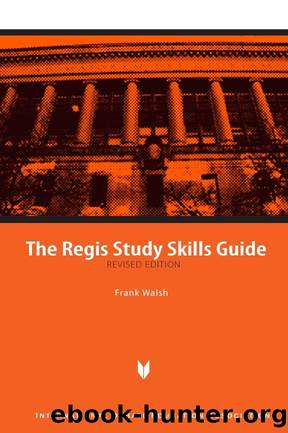The Regis Study Skills Guide by Chris Reisig

Author:Chris Reisig [Reisig, Chris]
Language: eng
Format: mobi
Tags: Education
ISBN: 9781932716375
Publisher: International Debate Education Association
Published: 2008-03-01T00:00:00+00:00
I. American League
A. Eastern Division
1. New York Yankees
a. pitchers
6. There is no need to perfect an elaborate system of shorthand in order to take good notes. Instead, you might simply glance over the following list of ideas and adopt those that suit your particular needs:
a. Omit âaâ and âthe.â
b. Omit unimportant verbs.
is
be
went
c. Use symbols for common connecting words.
& = and
w/ = with
w/o = without
== results in, leads to
vs.= against
â´ = therefore
d. Use mathematical symbols where they are appropriate.
â = does not equal
a > b = a is greater than b
a < b = a is less than b
f = frequency
e. Omit periods in standard abbreviations.
eg = for example (from the Latin exempli gratia)
ie = that is (from the Latin id est)
dept = department
CIA = Central Intelligence Agency
f. Use only the first syllable of a word.
col = colony
dem = democracy
rep = representative
g. Use all of the first syllable and only the first letter or two of the second.
comp = comprehensive
ind = individual
subj = subject
h. Eliminating final letters, use just enough of the beginning of a word to recognize it easily.
ach = achievement
info = information
intro = introduction
transp = transportation
i. Omit vowels from the middle of words, keeping only enough consonants to recognize the word immediately.
bkgd = background
maj = majority
pkgd = packaged
spt = sport
j. Use an apostrophe where appropriate.
amât = amount
govât = government
k. Form the plural of an abbreviated word by adding âs.â
chaps = chapters
rivs = rivers
l. Use only a âgâ to stand for âingâ endings.
decrg = decreasing
exprtg = exporting
wlkg = walking
m. After you have fully written out a name or title a first time, use only its initials when you refer to it again. (Write out âNational Labor Relations Boardâ the first time you refer to it, but âNLRBâ in all subsequent references.)
7. It is wasteful to completely rewrite your notes. Make them usable as you are writing them down by leaving generous amounts of space in the margins and at the bottoms of pages. One convenient method for increasing the usefulness of your notes is to leave about 2% or 3 inches of space in the left-hand margin. When the lecture or discussion is over, you can then go back to provide marginal summaries of the information that clarify and organize ideas.
8. Whether you are taking notes by hand or making use of a laptop, always use the left-hand margin as a review or recall column. Place headings or concise summaries in this space when you review your notes after class. When you are finished making this marginal outline of the lecture or discussion, cover the main column and, using your jottings in the review or recall column, state the facts and ideas mentioned in the class as you remember them. Make questions out of your marginal headings in the same way that you were urged to do with headings in textbooks. Next, uncover the main column to determine the accuracy of your oral recitation of the material covered in class. This procedure, intended to activate you in the process of learning, is a key to fastening information into your long-term memory.
Download
This site does not store any files on its server. We only index and link to content provided by other sites. Please contact the content providers to delete copyright contents if any and email us, we'll remove relevant links or contents immediately.
The Art of Coaching Workbook by Elena Aguilar(51148)
Trainspotting by Irvine Welsh(21625)
Twilight of the Idols With the Antichrist and Ecce Homo by Friedrich Nietzsche(18611)
Fangirl by Rainbow Rowell(9220)
Periodization Training for Sports by Tudor Bompa(8241)
Change Your Questions, Change Your Life by Marilee Adams(7727)
This Is How You Lose Her by Junot Diaz(6866)
Asking the Right Questions: A Guide to Critical Thinking by M. Neil Browne & Stuart M. Keeley(5747)
Grit by Angela Duckworth(5589)
Red Sparrow by Jason Matthews(5460)
Paper Towns by Green John(5168)
Room 212 by Kate Stewart(5096)
Ken Follett - World without end by Ken Follett(4712)
Housekeeping by Marilynne Robinson(4429)
The Sports Rules Book by Human Kinetics(4374)
Double Down (Diary of a Wimpy Kid Book 11) by Jeff Kinney(4257)
Papillon (English) by Henri Charrière(4247)
The Motorcycle Diaries by Ernesto Che Guevara(4078)
Exercise Technique Manual for Resistance Training by National Strength & Conditioning Association(4052)
